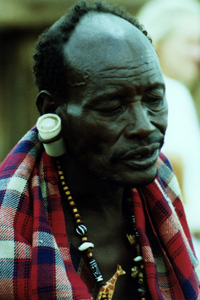
According to National Geographic (NG, August 1999) there are at least 5000 indigenous cultures worldwide. 6000 languages are still spoken. 300 million people, approximately 5 percent of the global population, are still retaining a strong identity as members of an indigenous culture. But for how long?
Based on this, NG rose an interesting question, which really concerns us explorers: the issue is whether ancient culture will be free to change on their own terms? And I wonder; regarding their culture how interesting will it be to visit them in the future?
The mentioned event will be held from 9th to 10th August this year at the United Nations Headquarters in New York. The primary purpose is to exchange and to stimulate awareness on the issues relating to indigenous peoples and land issues.
Photo. The Masai tribe in Kenya dances to honour their guests.
In addition consulting preparations will be made for the World Conference Against Racism, Racial Discrimination, Xenophobia and Related Intolerance. This is based on suggested issues of concern to indigenous peoples, within the context of the draft agenda of the World Conference.
The five main themes of the World Conference are the following:
Theme 1: Sources, causes, forms and contemporary manifestations of racism, racial discrimination, xenophobia and related intolerance;
Theme 2:Victims of racism, racial discrimination, xenophobia and related intolerance;
Theme 3: Measures of prevention, education and protection aimed at the eradication of racism, racial discrimination, xenophobia and related intolerance, at the national, regional and international levels;
Theme 4: Provision of effective remedies, recourses, redress [compensatory] and other measures at the national, regional and international levels;
Theme 5: Strategies to achieve full and effective equality, including international co-operation and enhancement of the United Nations and other international mechanisms in combating racism, racial discrimination, xenophobia and related intolerance, and follow-up.
These issues bring my reflections to the book Rivers of Blood, Rivers of Gold (Europe's conflict with tribal peoples; 1998), written by the brave author Mark Cocker. Some few countries in Europe have during centuries set their mark on the people living in other continents.
His book is about explorations and adventures, but it is first and foremost about exploitation and destruction. First of all we should start thinking about our own behaviour, and what we do to the people we visiting around the world. Age-old cultures are more than ever threatened by modern influence.
We have to appreciate and take care of what we have. For us explorers is it important to respect, encourage and help people with other lifestyle, languages, cultures and religion, to retain their unique identity. The world will be a less interesting place to live if indigenous people vanished, and there will be nothing left to explore.
Stein Morten Lund, 5 August 2000
